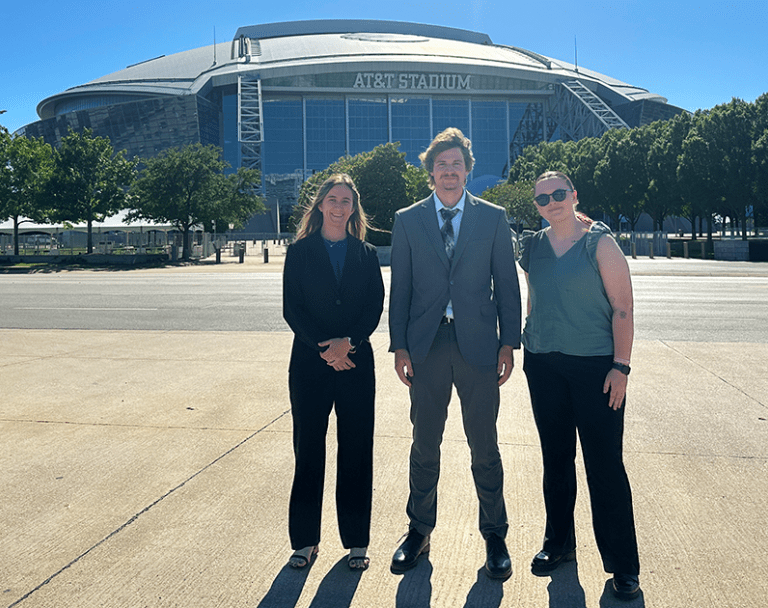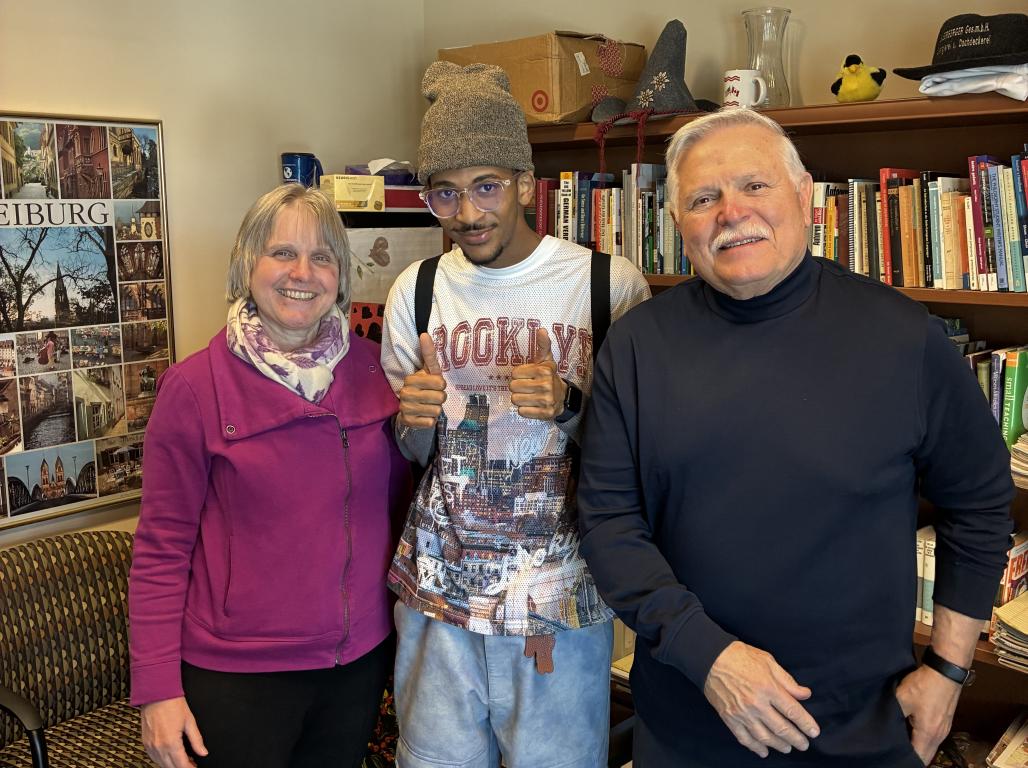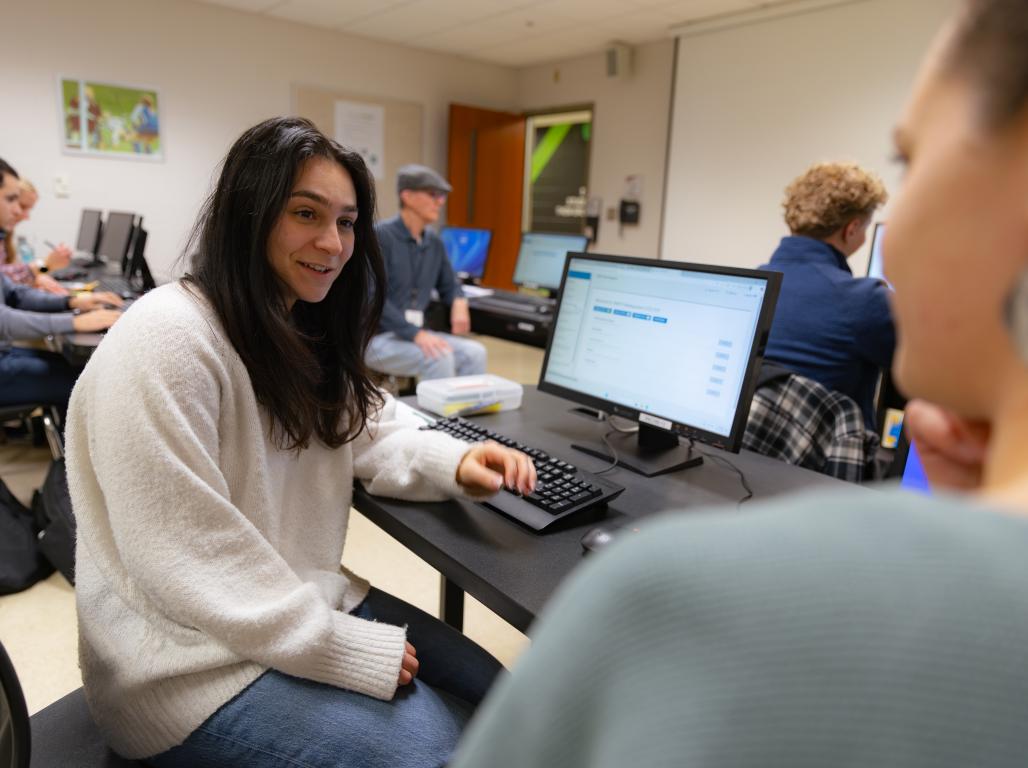Students Present Data-Driven Insights at World Cup Innovation Summit

An interdisciplinary team from York College of Pennsylvania gained global experience at the intersection of sports, business, and analytics.
With Dallas gearing up to host the 2026 FIFA World Cup, the biggest competition in international soccer, top minds in sports, business, and technology gathered in May for the 2025 World Cup Innovation Summit in Dallas/Frisco, Texas. Among them was an interdisciplinary undergraduate team from York College of Pennsylvania.
Representing one of only six schools to attend nationwide and one of just two undergraduate teams in the mix, the students stepped onto an international stage to tackle real-world challenges in data, marketing, and sports.
Competing on a global level
Led by Inje Cho, Ph.D., Assistant Professor of Sport Management, and with support from the Graham School of Business, four students majoring in Sport Management, Marketing, and Business Analytics teamed up to participate in the U.S. Soccer Student Hackathon before and at the summit.
The hackathon provided each team with thousands of raw e-commerce data points. Teams had 72 hours to use the data to create an interactive dashboard tailored to the U.S. Soccer Federation. The York College team employed Tableau, a data visualization tool the students had learned in Dr. Cho’s Sport Marketing and Dr. Wei Chen’s Business Analytic Classes.
Three of the students, Jordyn Woodling, Sport Management, and Ian Bartles and Alyssa DeFranks, Business Analytics majors, then traveled to Texas to present their dashboard and insights to U.S. and Dutch Soccer Federations representatives. Angel Cartagena-Luna, a Marketing major, participated in the hackathon but was unable to attend the presentation in Texas.
“Even though we were one of two undergraduate programs among mostly MBA teams, our students earned praise from the VP of Engineering at U.S. Soccer,” says Dr. Cho. “They had really great adaptability.”
Collaboration across disciplines
Dr. Cho intentionally built a cross-disciplinary team, an idea encouraged by Dr. Molly Sauder, Dean of the Graham School of Business. The initiative aligns with past recommendations from the York College Sport Management Industry Board, which previously emphasized the importance of data analytics—leading to the integration of Tableau into the curriculum. By chance, Dr. Cho later came across the World Cup Innovation Summit opportunity and saw it as a natural extension of these earlier efforts.
“It was a cross-discipline opportunity,” Dr. Cho says. “They all had one big goal: to understand how data informs business decisions.”
The students embraced that spirit of collaboration. Jordyn focused on assisting with the cleaning and processing the team’s thousands of data points and using them to create the dashboard charts.
“We were able to cohesively bounce ideas off one another where we may not be able to do if we were all one major,” she says.
Ian used his skills and experience to focus on assembling the graphics, charts, and data sets in Tableau. Presenting their work alongside that of prestigious schools such as California Polytechnic State University, the University of Oregon, and Stephen F. Austin State University, then pitching in front of international executives, was daunting for him at first.
“I can say for sure that putting what I learned in the classroom to use in an actual, practical, real-world scenario with executives who were actively looking to utilize our findings was not easy,” he says. “The ideas we had to create needed to be actionable rather than just looking pretty on a poster board.”
Ultimately, the camaraderie among everyone involved helped ease the pressure and forge an experience that Ian hopes to participate in next year.
Alyssa focused on organizing and interpreting data to support the project’s main themes. She ensured that the information presented was accurate and impactful.
“As a Business Analytics major, I was able to apply my skills in data analysis, visualization, and critical thinking to help identify meaningful trends and communicate them clearly,” says Alyssa. “This experience showed me how the tools I’m learning in my major can be used to tell compelling stories and support decision-making in real-world settings.”
Hands-on learning in action
The intensity of the experience wasn’t lost on the students, who were nervous before the trip to Texas. They had spent a focused 72 hours before their flight working on the hackathon criteria and creating their interactive dashboard on poster board. Then, because of flight issues, the team didn’t arrive at its hotel in Texas until 3:30 a.m. Its presentation was at 9 a.m. the same day.
With minimal sleep and mounting stress, the students gathered themselves and prepared to present to the soccer federation leaders.
“The stress of the unknown can turn into fun if you enjoy what you’re talking about,” Jordyn says. “You never know what you can do unless you step out of your comfort zone.”
Alyssa echoed that sentiment. For her, the key takeaway was to be proud of her experiences and the opportunities they present.
“Not everyone gets the opportunity to create a project they’re truly passionate about, let alone present it and network with professionals and peers from across the country,” she says.
For Dr. Cho, watching his students thrive and demonstrate flexibility under pressure while building invaluable industry connections was his proudest moment. With this experience in the books, he hopes to return with a team next year, more prepared and with deeper insights.
“Adaptability is just as important as all the technical skills or textbook knowledge that they have,” he says. “Experiential learning empowers students to see themselves as a future contributor to the sports business landscape.”
The 2026 World Cup kicks off on June 11, 2026, in Dallas. York College students will be ready in May 2026 for the next World Cup Innovation Summit, armed with interdisciplinary-fueled creativity and the confidence that comes from real-world learning.




